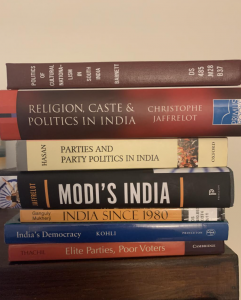An honors thesis provides exceptional, driven students the opportunity to further pursue an area of academic interest while working closely with a faculty advisor.
Deciding to do an honors thesis, however, is not a decision to be made on a whim but is instead a serious commitment — these six-credit-hour independent research projects span an entire year and result in a thesis that must be defended before a faculty committee. Eligibility and specific requirements vary by department, but to give an idea of scale, an honors thesis is typically between 45 and 100 pages.

In the realm of the liberal arts, Annemarie Wolf ’22, a history major at the College of William and Mary, is studying regional dialects in ancient Egyptian texts and how these dialectal differences shed light on local identities.
Wolf developed an interest in Egyptology as a freshman after taking professor Jeremy Pope’s Deciphering Ancient Egypt courses. These courses led to her conducting two James Monroe Scholar Program research projects anchored in Egyptology, one about 25th dynasty name erasures and the other about the Coptic language.
When it came to her thesis, Wolf wanted to continue her study of ancient Egypt with Pope as her advisor but did not have a specific topic in mind until she somewhat randomly stumbled onto the idea. After attending a Zoom call where people happened to be discussing the concept of identity, she realized that she could examine Egyptian identity through her knowledge of both the Egyptian and Coptic languages.
Wolf said that planning an honors thesis involves a decent amount of paperwork, especially for those seeking summer funding from the Roy R. Charles Center who need to get a head start the summer before their senior year. Wolf, who received summer funding, spent the whole summer doing research.
Wolf noted that the thesis requires an intense time commitment, and balancing a thesis with four other classes can be a “bit insane.” Wolf stressed that students should know that writing an honors thesis can be an extremely stressful experience, one which can also be a significant drain on one’s mental health, especially if coupled with COVID-19 burnout.
Wolf had decided to pursue an honors thesis because she thought the experience would make her a better student, but for those like her not interested in graduate school, Wolf explained that a thesis may not be worth the stress. Although she loves her topic and working with her advisor, if she could do it over again, she would not have opted to take on the added responsibility and stress.
Her advice to students considering a thesis is to “weigh the costs against the benefits very carefully” based on college and career goals.
More specifically, Wolf would not recommend a thesis to those who find writing or researching stressful or find themselves constantly needing extensions, and she notes that the experience can particularly be difficult for perfectionists who feel the need to try to examine every source in the literature.

Thomas Hess ’22, a biology major at the College, is studying the location of thyroid receptor hormones within cells for his honors thesis. Although Hess’ thesis technically falls under the biology department, he is also working with a data science professor for the modeling aspects of the project. Hess’ thesis is a combination of his academic interests — his study of thyroid receptor hormones stemmed from working in Dr. Lizabeth Allison’s lab for the past three years while the modeling side of the project was inspired by his data science minor.
Hess, who plans to study epidemiology in graduate school, explained that his thesis made him a much more competitive candidate for graduate school, and he recommends any STEM major active in labs to consider doing a thesis.
However, Hess did note that an honors thesis is not for everyone — students need to consider the commitment and be passionate about their topic.
“Adding a thesis to your schedule may be too much, and that is ok! Being a William and Mary student and graduating is a serious accomplishment in its own right. Finally, if you do decide to commit to your thesis, make sure you are a nerd about the subject,” Hess wrote.
Hess also explained that those taking on a thesis need to be willing to give up weekends during their last semester to work on it.
For those planning to pursue a thesis, Hess stressed the importance of not only closely engaging with one’s advisor, but also consulting with other professors whose varied professional expertise could help shape and improve aspects of the thesis. For STEM majors specifically, he recommends running the experiments and collecting data as soon as possible due to the time-consuming nature of data management.
For Hess, doing an honors thesis has been a uniquely rewarding experience.
“The progress I make on the thesis gives me a special kind of confidence I do not get from other classes. I would certainly do it again,” Hess wrote.

Max Markel ’22 is studying opposition politics in Indian state elections for his government honors thesis. Markel has been interested in Indian politics since his freshman year and plans to attend Leiden University in the Netherlands for a master’s degree in political science with a concentration in comparative politics, and he hopes to focus particularly on South Asian politics. Markel’s thesis topic was firmly rooted in his passions and is an expansion of a paper he wrote for his South Asian Politics class with Professor Rani Mullen.
Markel explained that the hardest part of doing a thesis is probably staying on track with deadlines, especially administrative ones, which can sneak up quickly. Additionally, since the thesis is such a long, self-driven process, it can sometimes be hard to maintain motivation over the course of the year.
As for the time commitment, Markel likened the thesis to a full-credit course but one which involves much more writing than a typical government class — Markel estimated that he spends four hours a week writing and researching.
Markel recommends those who take on a thesis to pay careful attention to their time management and put effort into picking an advisor.
“Having a planner is super helpful to manage the time each week, especially since the earlier you start the research and writing the easier the thesis becomes. Picking an Honors Advisor who you like talking to and is helpful is also super important since they will really guide you if you have any questions, so their input is super vital,” Markel wrote.
Markel would “definitely” choose to write his thesis again, but given the huge commitment, he would not recommend it for everyone.
“I would recommend it to people who have a research question they really want to examine, and not just go into it casually,” Markel wrote.
Writing an honors thesis can be an extremely rewarding experience that leads to academic and professional betterment. However, at the same time, a thesis is an intense year-long project that requires extensive planning, motivation and commitment to see through, and as a result, is not in the best interests of every student.
Therefore, eligible students who are considering applying should carefully consider the commitment in relation to their own schedules and goals, talk to classmates and friends currently going through the process, explore previous student honors projects accessible online and discuss their options with friends, family and potential advisors to ensure that an honors thesis is the best decision.
CORRECTION: This article was corrected on April 4, 2022 to change the word “Hieroglyphics” to “Hieroglyphs” in the title of the article. The purpose was for the term used to be more accurate and scholarly.

